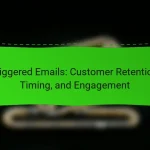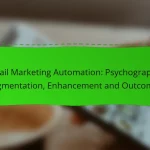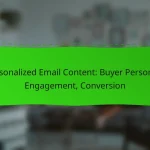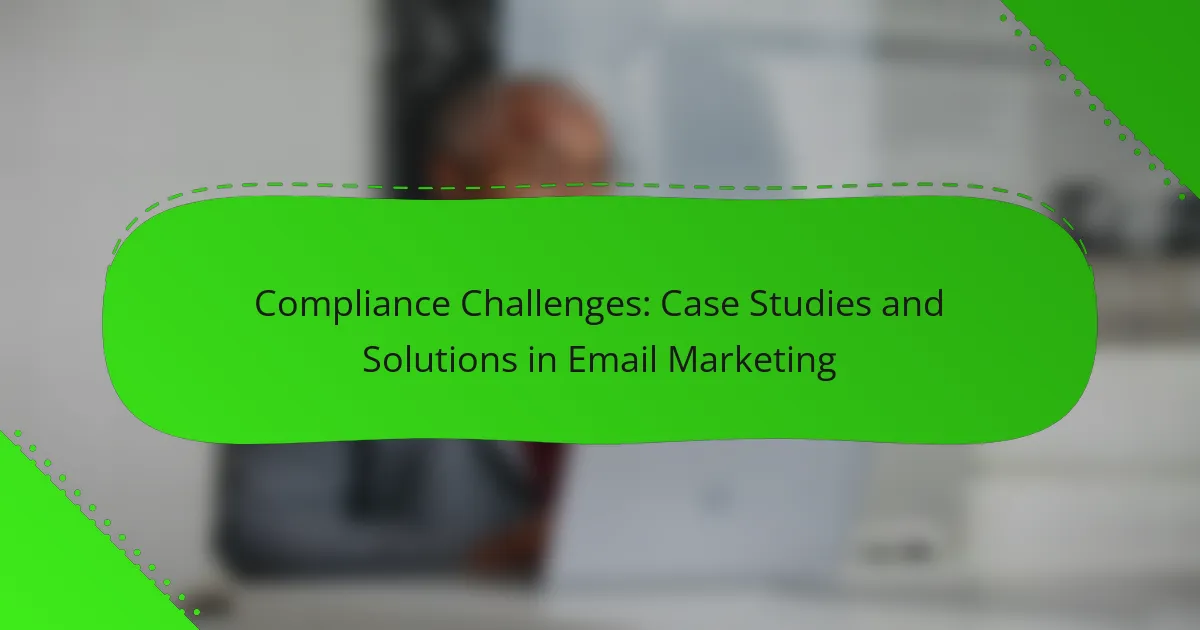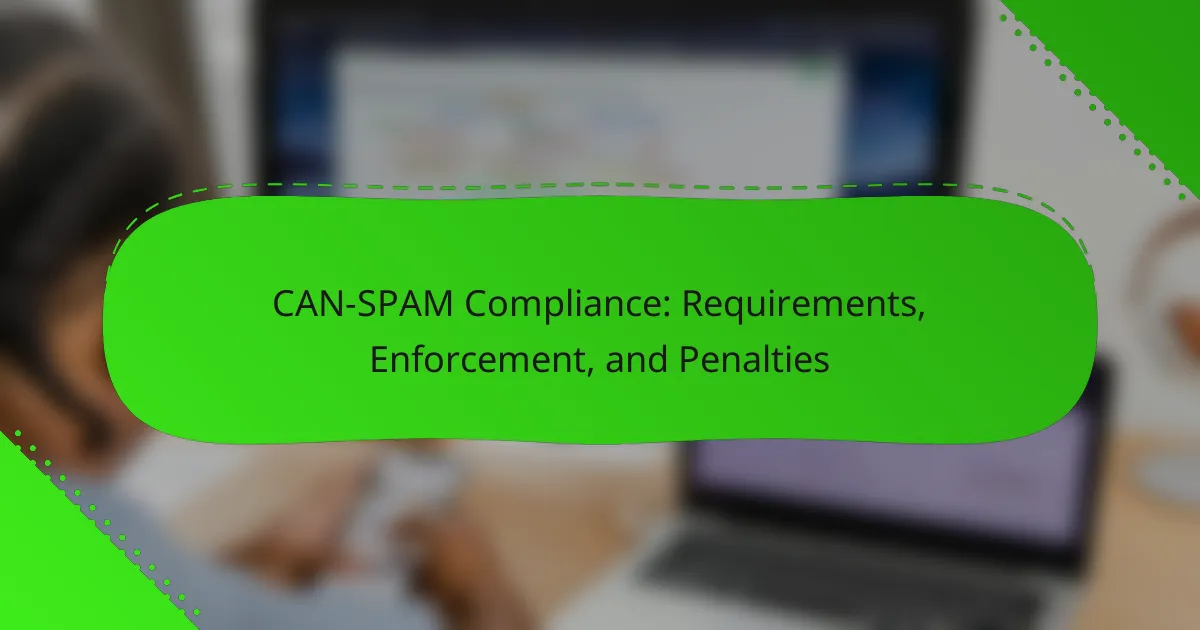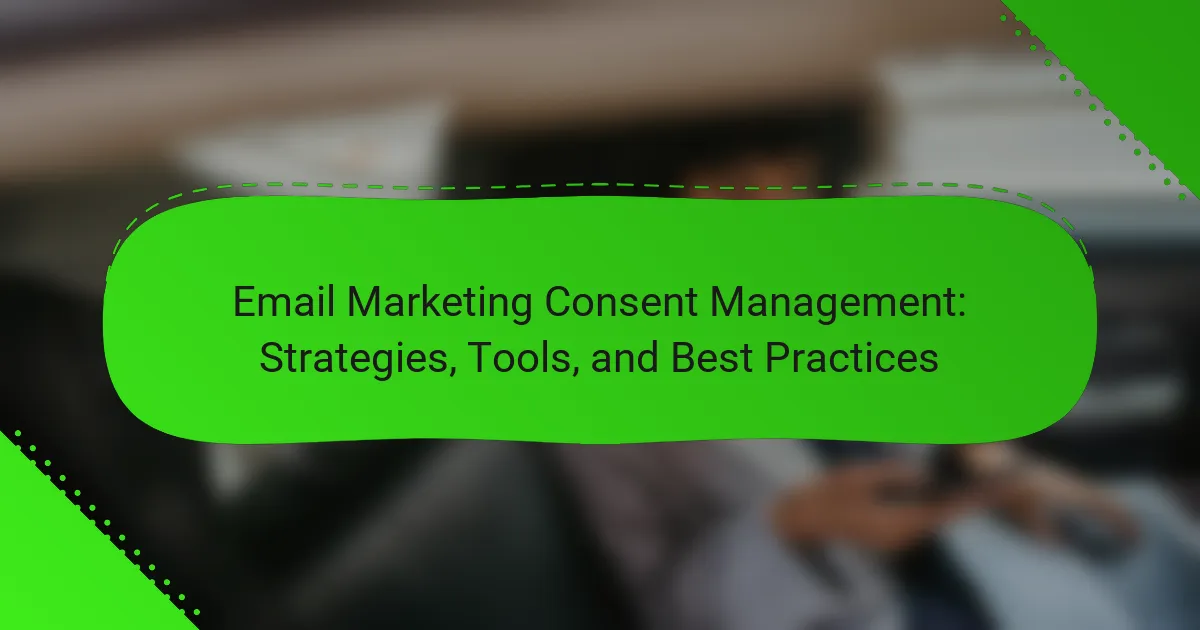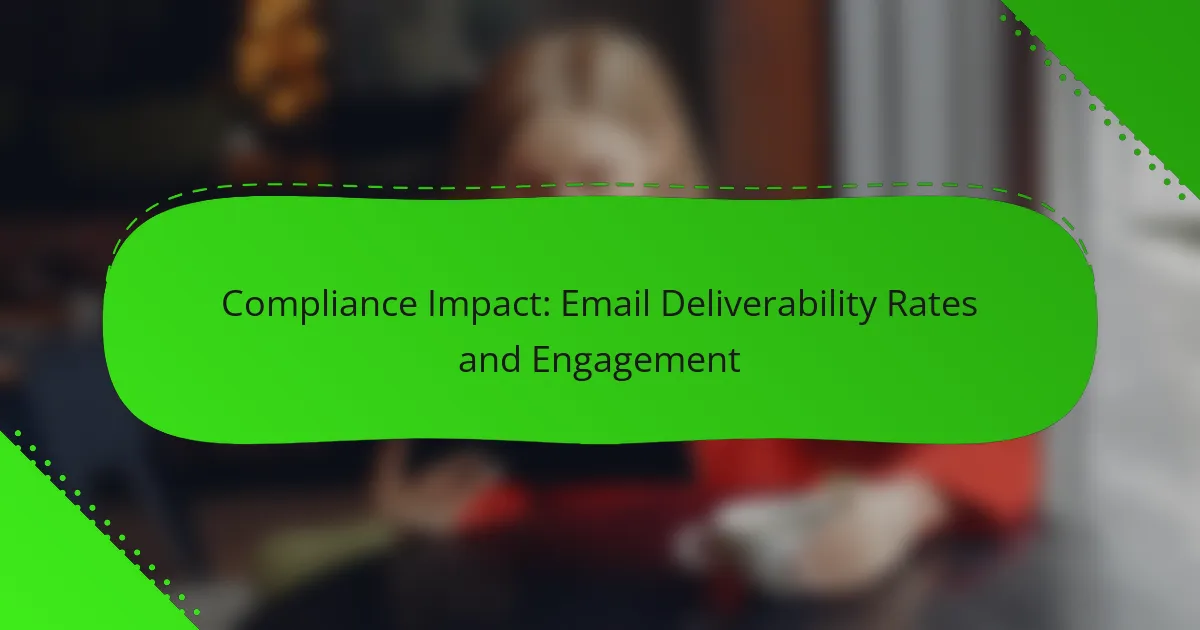Email marketing presents significant compliance challenges, particularly concerning data privacy and consent management. Understanding and adhering to regulations like the CAN-SPAM Act and GDPR is essential for businesses to foster customer trust and avoid legal repercussions. This discussion will explore effective case studies that showcase successful strategies for navigating these compliance issues while maintaining strong customer engagement.
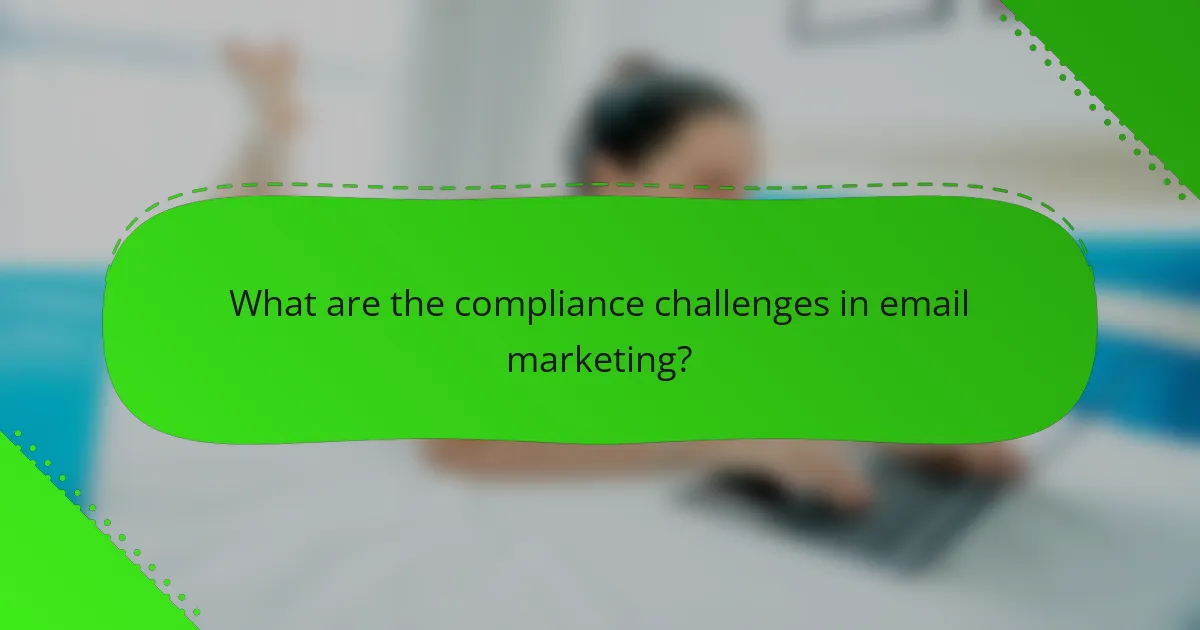
What are the compliance challenges in email marketing?
Email marketing faces several compliance challenges, primarily related to data privacy, consent management, and spam regulations. Navigating these issues is crucial for maintaining customer trust and avoiding legal penalties.
Data privacy regulations
Data privacy regulations, such as the General Data Protection Regulation (GDPR) in Europe and the California Consumer Privacy Act (CCPA) in the United States, impose strict rules on how businesses collect, store, and use personal data. Companies must ensure they have a lawful basis for processing personal information and must be transparent about their data practices.
To comply, businesses should implement clear privacy policies, conduct regular audits of their data handling practices, and provide users with easy access to their data rights. Failure to comply can result in hefty fines, often reaching millions of euros or dollars.
Consent management issues
Consent management is critical in email marketing, as regulations require explicit permission from users before sending marketing communications. This means businesses must have robust systems in place to obtain, record, and manage consent effectively.
To avoid pitfalls, companies should use double opt-in methods, where users confirm their subscription via email, and maintain detailed records of consent. Regularly reviewing and updating consent practices is essential to ensure ongoing compliance.
Spam laws and regulations
Spam laws, such as the CAN-SPAM Act in the U.S. and the Privacy and Electronic Communications Regulations (PECR) in the UK, set guidelines for commercial emails. These laws require marketers to provide clear identification, an easy opt-out mechanism, and accurate subject lines.
To comply with spam regulations, businesses should regularly clean their email lists to remove inactive subscribers and ensure all communications include a visible unsubscribe option. Ignoring these regulations can lead to fines and damage to a brand’s reputation.
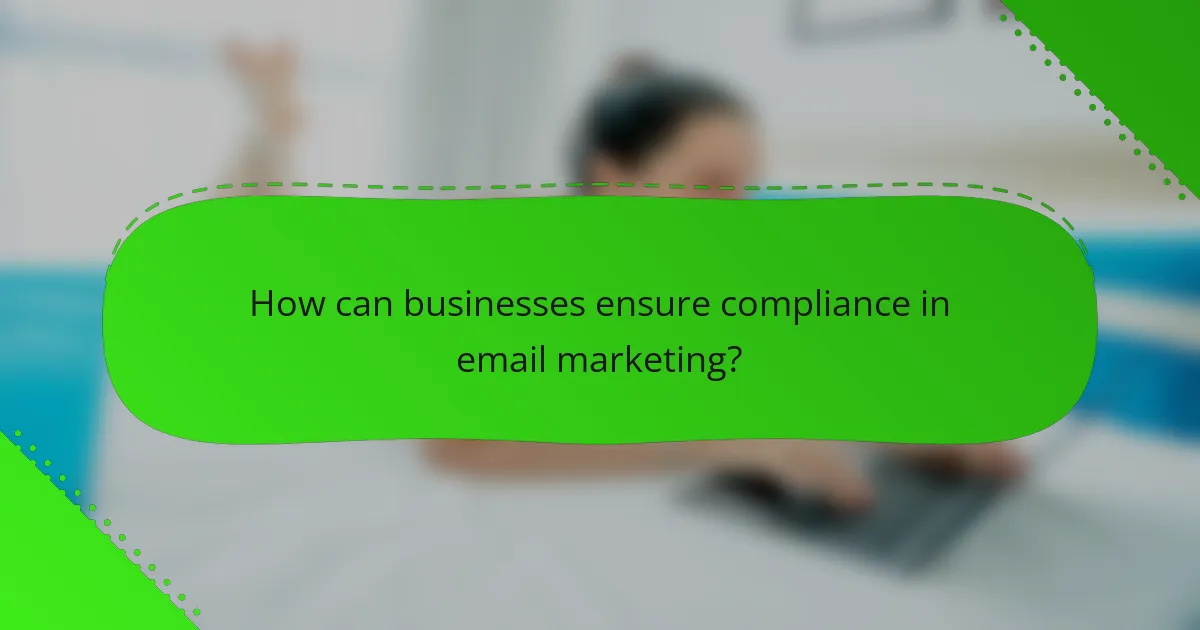
How can businesses ensure compliance in email marketing?
Businesses can ensure compliance in email marketing by adhering to regulations such as the CAN-SPAM Act and GDPR. Key practices include obtaining explicit consent from recipients and providing clear opt-out options in every email.
Implementing double opt-in processes
A double opt-in process requires users to confirm their subscription via a follow-up email. This method not only verifies the email address but also ensures that the subscriber genuinely wants to receive communications. Implementing this can significantly reduce the risk of spam complaints.
To set up a double opt-in, first, collect the user’s email address, then send a confirmation link. Only add them to your mailing list after they click this link. This practice enhances trust and improves engagement rates.
Regularly updating privacy policies
Regularly updating privacy policies is crucial for compliance in email marketing. These policies should clearly outline how subscriber data is collected, used, and protected. It’s advisable to review and revise these documents at least annually or whenever there are significant changes in data handling practices.
When updating your privacy policy, ensure it is easily accessible on your website and communicated to your subscribers. Transparency fosters trust and helps avoid potential legal issues.
Utilizing compliance software
Compliance software can streamline the process of adhering to email marketing regulations. These tools often include features for managing consent, tracking opt-outs, and ensuring that email lists are clean and compliant with regulations like GDPR and CAN-SPAM.
When selecting compliance software, consider factors such as user-friendliness, integration capabilities with existing marketing platforms, and the ability to generate compliance reports. This can save time and reduce the risk of non-compliance penalties.
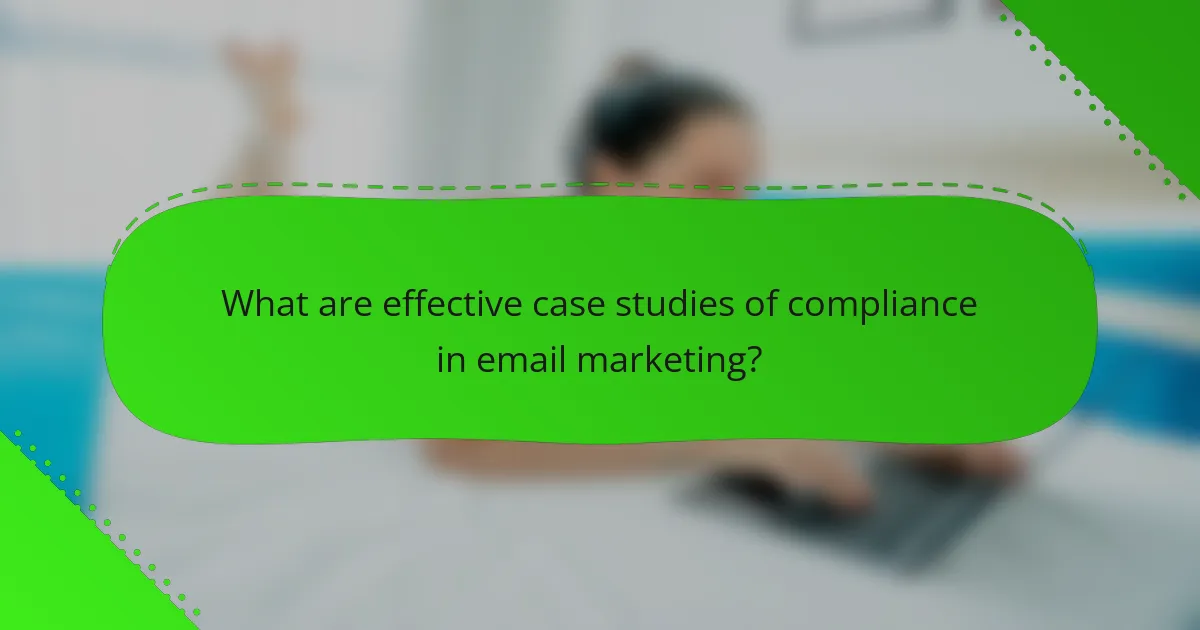
What are effective case studies of compliance in email marketing?
Effective case studies of compliance in email marketing demonstrate how companies successfully navigate regulations while maintaining customer engagement. These examples highlight practical strategies and solutions that can be adapted by other businesses to ensure compliance and build trust with their audience.
Case study: Mailchimp’s GDPR adaptation
Mailchimp adapted its email marketing practices to comply with the General Data Protection Regulation (GDPR) by implementing clear consent mechanisms. They introduced double opt-in processes, ensuring that subscribers explicitly confirm their interest before receiving communications.
Additionally, Mailchimp provided users with tools to manage their preferences and easily unsubscribe. This transparency not only helped them meet legal requirements but also enhanced customer trust, leading to higher engagement rates.
Case study: Constant Contact’s consent strategies
Constant Contact focused on building a robust consent framework to comply with various regulations, including the CAN-SPAM Act and GDPR. They emphasized the importance of obtaining explicit consent through easy-to-understand sign-up forms that clearly outline what subscribers can expect.
To further enhance compliance, Constant Contact regularly educates users about best practices for maintaining consent and managing subscriber lists. This proactive approach helps businesses avoid common pitfalls, such as sending unsolicited emails, which can lead to penalties and damage to reputation.
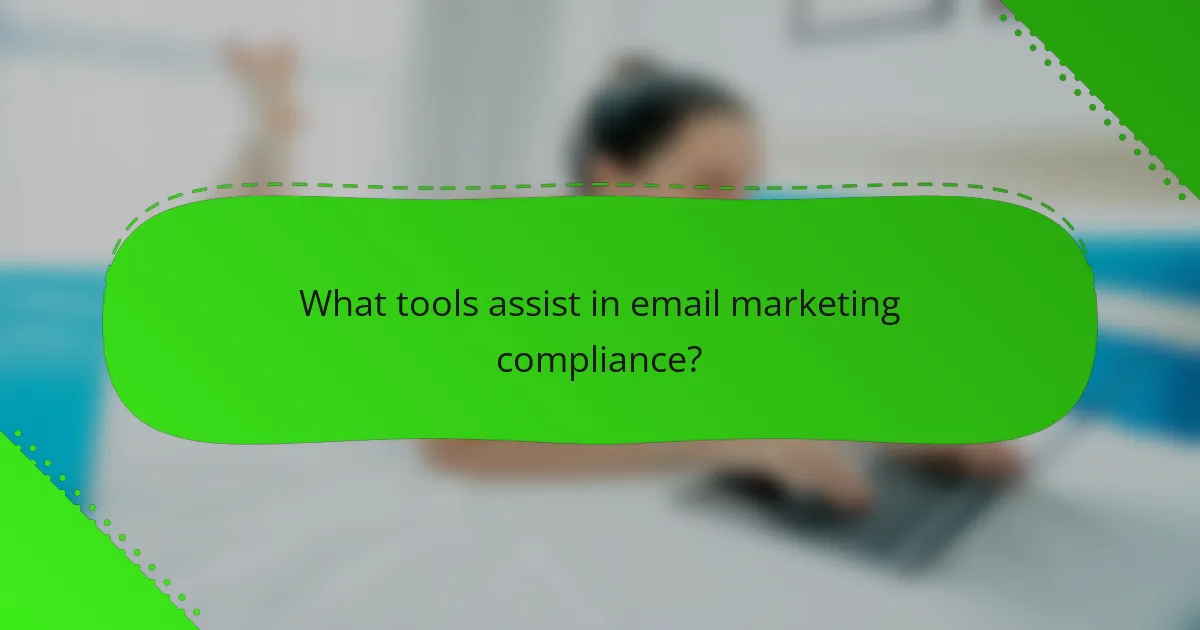
What tools assist in email marketing compliance?
Several tools can help ensure compliance in email marketing, focusing on regulations like GDPR and maintaining data integrity. These tools streamline processes, verify subscriber information, and help marketers avoid legal pitfalls.
GDPR compliance tools
GDPR compliance tools are essential for businesses operating in or targeting customers in the European Union. These tools help ensure that email marketing practices align with strict data protection regulations, such as obtaining explicit consent from subscribers.
Key features to look for include consent management systems, data processing agreements, and automated documentation tools. Popular options include OneTrust and TrustArc, which provide comprehensive solutions for managing user consent and data privacy.
Email verification services
Email verification services are crucial for maintaining a clean and compliant email list. These services check the validity of email addresses, reducing bounce rates and ensuring that communications reach actual subscribers.
When selecting an email verification service, consider factors like real-time verification, bulk processing capabilities, and integration with your email marketing platform. Services like NeverBounce and ZeroBounce are widely used for their accuracy and ease of use.
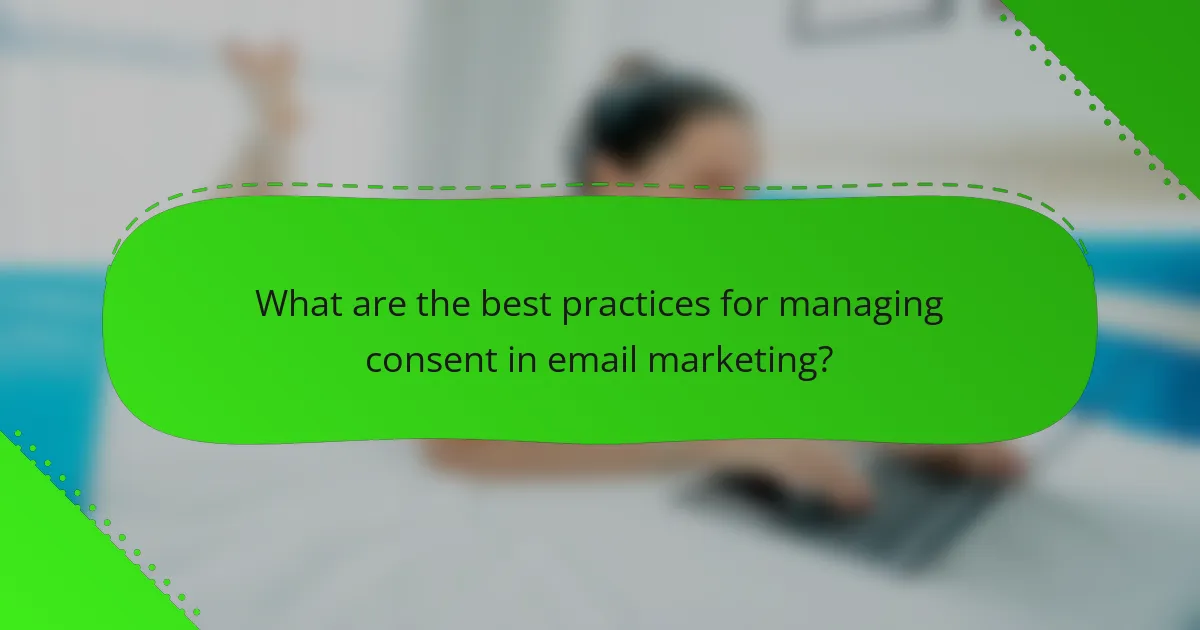
What are the best practices for managing consent in email marketing?
Effective management of consent in email marketing involves clear communication, regular audits, and adherence to relevant regulations. These practices ensure that marketers respect user preferences and maintain compliance with laws like GDPR and CAN-SPAM.
Clear communication of data usage
Clearly communicating how customer data will be used is essential for obtaining informed consent. This includes specifying what types of emails subscribers will receive and how their information will be stored and processed. Transparency builds trust and encourages users to opt-in.
Consider using concise language and straightforward examples in your consent forms. For instance, instead of vague terms like “promotional content,” specify “weekly newsletters and special offers.” This clarity helps users make informed decisions about their subscriptions.
Regular audits of consent records
Conducting regular audits of consent records is crucial for maintaining compliance and ensuring that your email marketing practices align with user preferences. This involves reviewing who has opted in, the methods used for consent, and whether any changes in data usage have occurred.
Establish a routine schedule for these audits, such as quarterly or biannually, to stay proactive. Additionally, keep track of consent expiration dates and ensure that users are reminded to renew their consent when necessary. This practice not only helps in compliance but also enhances customer relationships.
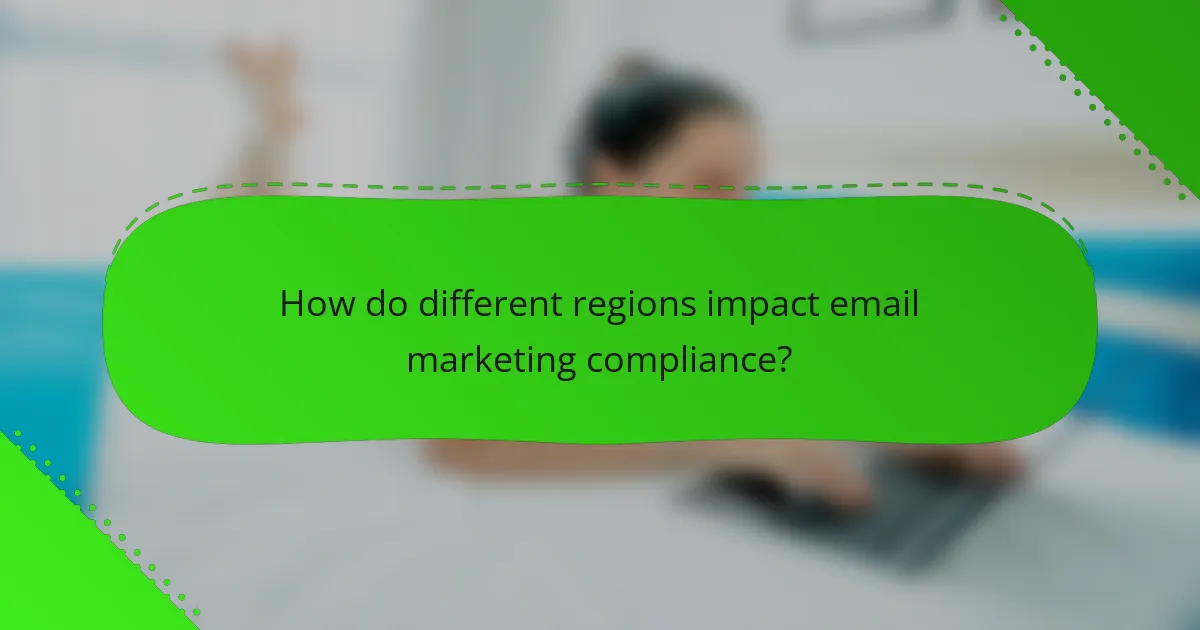
How do different regions impact email marketing compliance?
Different regions impose varying regulations that significantly affect email marketing compliance. Understanding these differences is crucial for marketers to avoid legal pitfalls and ensure effective communication with their audiences.
US vs. EU regulations
In the US, the CAN-SPAM Act sets the framework for email marketing, requiring marketers to provide clear opt-out options and accurate sender information. In contrast, the EU’s General Data Protection Regulation (GDPR) mandates explicit consent from users before sending marketing emails, along with strict data protection measures.
Marketers in the US can often rely on implied consent through existing customer relationships, while EU marketers must ensure explicit consent is obtained, which can complicate list-building efforts. Non-compliance in the EU can lead to substantial fines, making adherence to GDPR critical.
Regional case studies
In the US, a retail company successfully navigated CAN-SPAM by implementing a double opt-in process, which not only ensured compliance but also improved engagement rates. They focused on transparency in their email communications, which helped build trust with their audience.
Conversely, a European tech firm faced challenges with GDPR compliance when they transitioned to a new email marketing platform. They had to audit their existing subscriber lists to ensure all contacts had provided explicit consent, which required significant effort but ultimately led to a more engaged and compliant subscriber base.
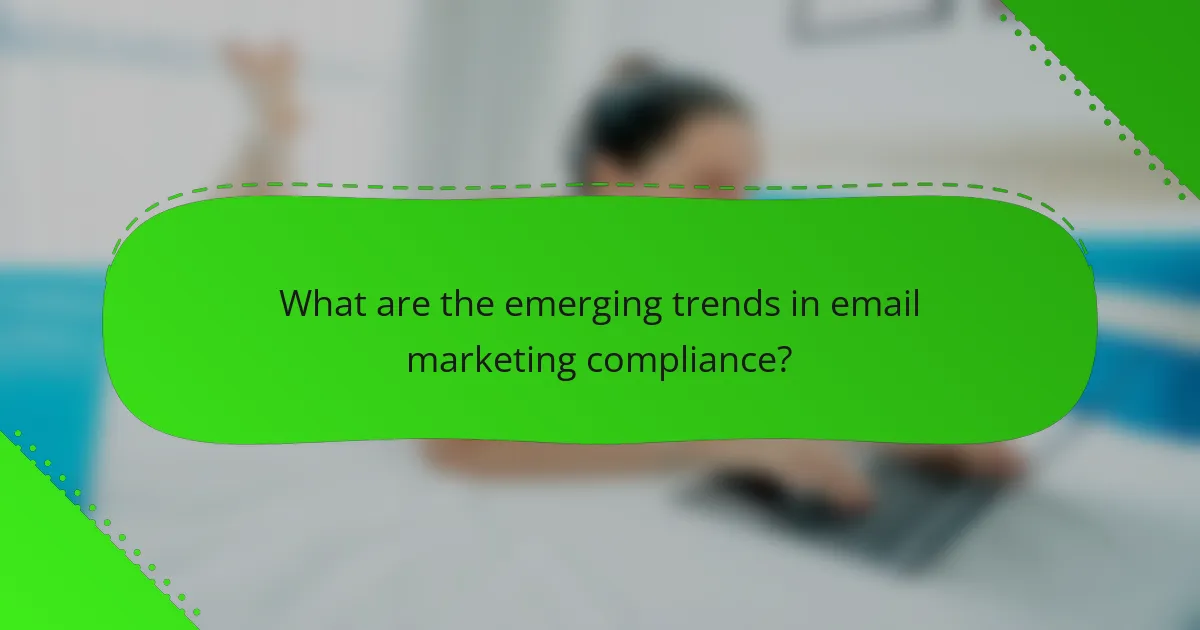
What are the emerging trends in email marketing compliance?
Emerging trends in email marketing compliance focus on stricter regulations, enhanced consumer privacy, and the integration of artificial intelligence. Marketers must adapt to these changes to ensure their campaigns remain effective and legally compliant.
Increased focus on data privacy regulations
Data privacy regulations, such as the GDPR in Europe and CCPA in California, are becoming more stringent. These laws require marketers to obtain explicit consent from users before sending promotional emails and to provide clear options for opting out.
Marketers should implement transparent data collection practices and ensure that their email lists are regularly updated to comply with these regulations. Failure to adhere can result in significant fines and damage to brand reputation.
Use of artificial intelligence in compliance monitoring
Artificial intelligence (AI) is increasingly being utilized to monitor compliance in email marketing. AI tools can analyze email content, subject lines, and recipient engagement to ensure adherence to regulations and best practices.
By leveraging AI, marketers can automate compliance checks, reducing the risk of human error and improving efficiency. This technology can also help in personalizing content while still respecting user privacy preferences.
Emphasis on user consent and engagement
There is a growing emphasis on obtaining user consent and fostering engagement in email marketing. Marketers are encouraged to use double opt-in methods, which require users to confirm their subscription, ensuring that only interested recipients are added to email lists.
Engagement metrics, such as open rates and click-through rates, are critical for maintaining compliance and improving deliverability. Marketers should regularly analyze these metrics to refine their strategies and enhance user experience.
